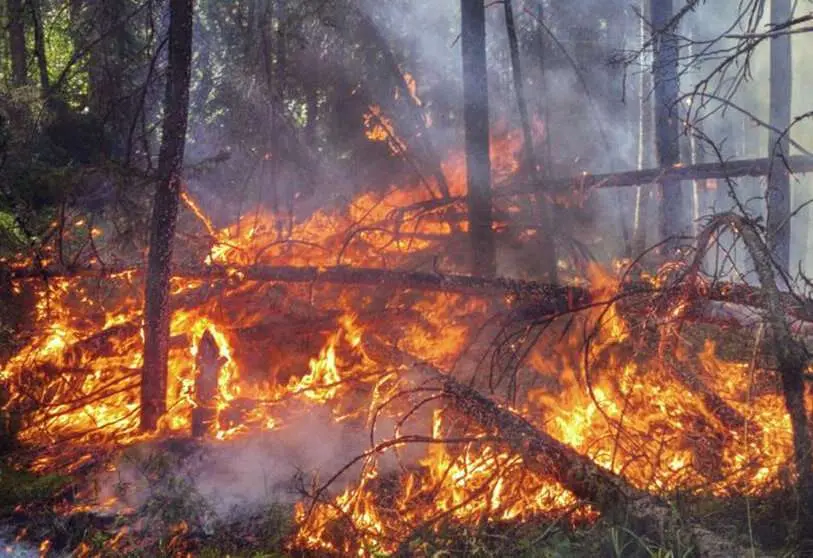Either more ambitious action is taken or the consequences of climate change "will be devastating"

A new multi-agency report* from the World Meteorological Organisation highlights the wide gap between climate aspirations and reality and warns that without "much more ambitious" action, the "physical and socio-economic" consequences of climate change "will become increasingly devastating".
The study, entitled "United in Science", notes that greenhouse gas concentrations continue to rise and reach new peaks. The temporary decline in fossil fuel emission rates that occurred during the COVID-19 confinements were a mirage, as they now exceed pre-pandemic levels.
It also points out that the ambition needed to meet emission reduction commitments by 2030 must be seven times higher to meet the goal of limiting global warming to 1.5°C set in the Paris Agreement.
It adds that the last seven years have been the warmest on record and that the probability that the average annual temperature will be temporarily 1.5°C higher than the 1850-1900 average in at least one of the next five years is 48%.
Meanwhile cities, which are home to billions of people and account for up to 70% of man-made emissions, will face increasing socio-economic impacts. The most vulnerable populations will suffer the most, says the report, which gives examples of extreme weather events in different parts of the world this year.

Floods, droughts, heat waves, extreme storms and forest fires are going from bad to worse, breaking records with increasingly alarming frequency," said António Guterres in a video message for the launch of the report.
António Guterres stressed that the magnitude of recent phenomena such as heat waves in Europe, floods in Pakistan or prolonged droughts in China, the Horn of Africa and the United States, "have nothing natural about them" and that they represent "the price to be paid for humanity's addiction to fossil fuels".
He warned that the impacts of climate change "are entering uncharted territory of destruction" and that, despite this situation, "every year we insist on doubling this addiction to fossil fuels, while the symptoms are rapidly worsening".
"Climate research is increasingly showing that many of the extreme weather events we are experiencing have become more likely and more intense due to climate change caused by human activities," said the secretary general of the World Meteorological Organization.
Professor Petteri Taalas noted that this year we have seen this phenomenon "repeatedly" with tragic consequences and stressed the importance of intensifying "the use of early warning systems to build the resilience of vulnerable communities to current and future climate risks".
Taalas recalled that the organisation is leading a campaign to "ensure Early Warning for All in the next five years".

Levels of carbon dioxide (CO2), methane (CH4) and nitrous oxide (N2O) in the atmosphere continue to rise. The temporary reduction in CO2 emissions observed in 2020, during the pandemic, had little impact on the increase in atmospheric concentrations (what remains in the atmosphere after CO2 is absorbed by the ocean and biosphere).
In 2021, global fossil CO2 emissions returned to pre-pandemic levels in 2019, after falling by 5.4% in 2020 as a result of widespread confinement. Preliminary data show that global CO2 emissions in 2022 (January to May) are 1.2% above the levels recorded during the same period in 2019, as a result of increases in the United States, India and most European countries.
A quarter of greenhouse gas emissions from land-use change are related to food trade between countries, of which more than three-quarters are due to land clearing for agriculture, particularly grazing.
About 90% of the heat stored in the Earth system is stored in the ocean. The ocean heat content for the period 2018-2022 was higher than for any other five-year period, as ocean warming rates have increased particularly steeply over the past two decades.
In each of the years from 2022 to 2026, global annual mean near-surface temperature is projected to exceed pre-industrial levels (1850-1900) and the increase is expected to range from 1.1°C to 1.7°C.

Cities, which are home to 55% of the world's population, or 4.2 billion people, generate up to 70% of man-made emissions, while being highly vulnerable to climate change impacts such as increased heavy precipitation, accelerated sea level rise, acute and chronic coastal flooding and extreme heat, among other major risks.
By the 2050s, more than 1.6 billion people in more than 970 cities around the world will be regularly exposed to three-month average temperatures reaching at least 35°C.
Low-lying coastal cities and settlements such as Bangkok (Thailand), Houston (United States) and Venice (Italy) are likely to experience more frequent and extensive coastal flooding as a result of sea-level rise, storm surges and subsidence. The number of weather, climate and water-related disasters has increased five-fold over the past 50 years, resulting in daily losses of US$202 million.
With between 3.3 and 3.6 billion people living in contexts highly vulnerable to climate change, it is more important than ever for the international community to take ambitious action not only to mitigate emissions, but also to promote adaptation to climate change, particularly to extreme and aggravating weather events, which can have long-lasting socio-economic impacts.
Early warning systems are a cost-effective and efficient means of adaptation that can save lives and reduce loss and damage. Less than half of the world's countries have reported the existence of multi-hazard early warning systems, as coverage is particularly poor in Africa, least developed countries and small island developing states.








